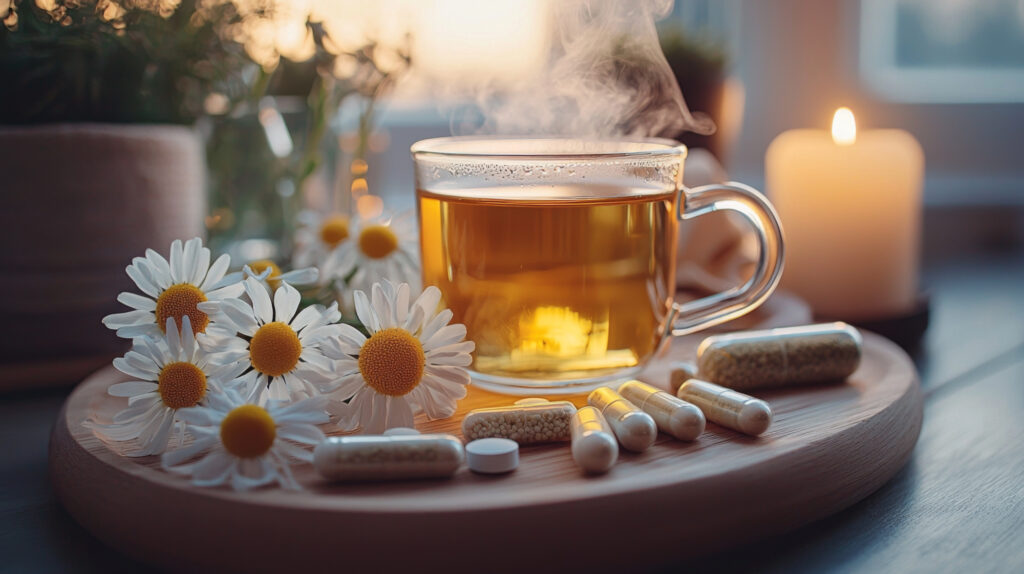Your mental well-being consists of a lot of different parts. It’s not just about thoughts or emotions. Mental wholeness is also about how you nourish yourself, how you move through the world and the small, everyday rituals you embrace. For women especially, self-care isn’t an indulgence; it’s a cornerstone of recovery. And here’s the beautiful part: science backs what your intuition already knows, and you might be looking for alternative ways to support your recovery. That’s why we want to talk about simple things – like a rejuvenating cup of herbal tea, an invigorating yoga session, and how choosing different haircare products can encourage a stronger life in recovery.
Herbal Tea and Mental Well-Being
Herbal tea has been around for thousands of years – and the reason for this is that it has genuine, authentic healing properties.
To wit, the National Center for Complementary and Integrative Health (NCCIH) states that certain herbal teas contain natural compounds that help lower stress hormones, promote relaxation, and improve sleep quality.
- Chamomile, for example, is packed with apigenin. This antioxidant connects to receptors in your brain, resulting in better sleep and reduced anxiety.
- Lavender is well known for its calming, soothing properties. It has been shown to ease nervous tension and reduce mental exhaustion.
- Peppermint is an energizing tea that battles against lethargy and fatigue. It can also help with digestion and mental clarity.
Start your morning with a steaming cup of peppermint tea to awaken your senses or wind down in the evening with chamomile to signal your body it’s time to rest.
Pair your tea ritual with journaling to release lingering thoughts, or sip a lavender blend during meditation to deepen relaxation. These small but intentional acts of self-care can create moments of peace in your day – one sip at a time.

Yoga and Improved Mental Health
Beyond its physical benefits, yoga is a bridge between the body and mind, and according to Harvard, it strengthens the connections that trauma or stress often frays. Each breath, each movement, is an invitation to be present – to notice without judgment, to listen without fear.
This kind of mindful awareness fosters self-compassion, replacing self-criticism with gentleness and patience. Over time, the practice becomes more than poses on a mat – it becomes a tool for emotional regulation, a way to reclaim balance, and a reminder that healing is possible and already unfolding within you.
Incorporating yoga into your routine doesn’t have to be complicated. Gentle flows, like restorative or yin yoga, can release tension and quiet the mind. Yoga Nidra, also known as yogic sleep, guides you into deep relaxation, while breathwork techniques like alternate nostril breathing can instantly soothe anxiety. The key is consistency – whether it’s five minutes or fifty, showing up for yourself on the mat is an act of self-care that ripples into every aspect of your well-being.
Clean Beauty and Mental Health: How Shampoo Bars & Natural Haircare Play a Role
Self-care isn’t just about what you put into your body – it’s also about what you put on it. An astonishing amount of commercial hair products contain harmful chemicals that can strip natural oils, irritate the scalp, and even interfere with hormone regulation. In fact, the Environmental Working Group (EWG) points out that some conventional haircare ingredients contain endocrine disruptors, which can negatively impact mood and overall well-being. Making the switch to clean, sulfate-free haircare reduces exposure to these harmful substances and supports both physical and emotional health.
Beyond the science, haircare is an intimate, sensory experience that can be deeply therapeutic. Establishing a self-care ritual – massaging the scalp, inhaling the subtle botanicals of natural ingredients, and embracing hair’s natural texture – can be grounding and restorative. Choosing gentle, nourishing alternatives, like shampoo bars, transforms hair washing from a rushed routine into a mindful act of eco-friendliness and self-love.
When selecting a clean shampoo, look for plant-based ingredients like aloe vera, argan oil, or chamomile, which soothe the scalp while strengthening hair. Avoid synthetic fragrances and harsh surfactants that can trigger irritation. And, most importantly, find a formula suited to your hair type. For instance, a wavy hair shampoo that enhances natural curls while giving you clean, chemical-free results might be the right choice for you.
Small Choices, Big Impact
Ultimately, wellness isn’t built in a day – it’s shaped by the small, intentional choices you make every single moment. Your mental well-being thrives when you give yourself permission to slow down, to care, and to heal. Self-care isn’t selfish; it’s essential. So, take a deep breath, start where you are, and let these simple rituals remind you that healing is always within reach.

Danielle is a substance abuse Case Manager specializing in substance abuse treatment, bringing both understanding and professionalism to her work. She loves empowering women, is committed to guiding her clients through their own personal recovery journeys with empathy, respect, and support. Through leading group sessions and sharing her own lived experiences she fosters a sense of community, helping women build healthier relationships with themselves and others. In Danielle’s spare time she is heavily involved in the local recovery community, her other passion is working with children and being a part of their developmental years, the rest of her time is devoted to obtaining her license to be Drug and Alcohol Counselor.
